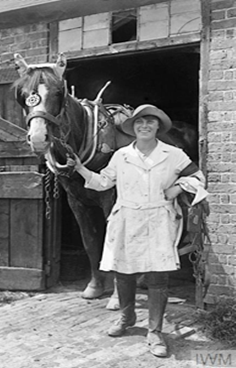Harvesting Hope: Congleton’s Women’s Land Army in the Great War
Author: Linda Hulse

In 1917 Britain was short of food. The conscription of farm workers plus the sinking of merchant ships by German U Boats raised the possibility of defeat through starvation. So in 1917 a Women’s Land Army was set up to provide farm labour and boost food production.
There was a campaign to recruit fit young women to work on the land and over 20,000 signed up encouraged by a poster campaign and rallies.
The prospective recruits had to be over 20 and they were given a medical to ensure they were fit. If they came from a farming background they were posted immediately, otherwise they had a month’s training. They were paid 18 shillings a week, increased to £1 if they passed their efficiency tests.
On Whit Monday,1918 there was a recruiting rally in Congleton. One local girl who joined up was 20 year old Martha Ford. She was the daughter of council gardener John Ford and his wife Ada, who lived in Milk Street. On the outbreak of war she was working as a fustian cutter, but was later employed making munitions at Washford Mill, Buglawton. Martha recalled that if her work there was inaccurate her wages were docked, and she used to avoid this by throwing her defective shell cases out of the window into the River Dane.
Martha had always been a spirited girl – in spite of her father working as a gardener in Congleton Park she was banned from entering after she ruined a band concert by standing in front of the bandsmen and sucking a lemon. The Land Army had an immediate appeal.
Essex clergyman, Reverend Andrew Clark, of Great Leigh wrote in his diary:
“In the High Street I met two young women, who represented (I assumed) the more swaggering lot of women workers on the land. They had riding breeches, like troopers, of khaki cloth, with brown boots and leggings, and an overall of Holland, white, coming down below the knees. Ordinary women’s hats. Carrying shortish rattans (canes) such as grooms might have. They looked as if they had gone astray from a comic opera.”
However, he also commented on a local farmer, who had lost men due to conscription,“…nine out of 36 men had gone from his farms…he must get eight women at once for farm work”
Martha and two other girls lodged with a farmer in rural Essex. One of her jobs was driving a cart to collect swill for the pigs. She maintained she soon got used to the smell and would eat apples as she drove from farm to farm, laughing at the queasy faces she passed on her round.
Martha was one of a small group of women trained to drive the new motor tractors. When she came home to Congleton on leave her father, John, was very proud of this and boasted to his mates in the pub. They refused to believe a girl could drive a tractor. A row broke out and bets were laid. Next day Martha and John, followed by a crowd of cynical men, visited a local farm, where she jumped on a tractor and drove round the field, waving, as her father collected his winnings.
At the end of the war there was an attempt to send Land Army girls to Canada to make a career in farming. Martha wanted to go but her father refused to allow her to emigrate.
This was just as well as the scheme failed – the Canadians didn’t want independent female farmers and tried to retrain the women in domestic duties so they could become wives and servants.
Martha returned to Congleton and married a local policeman. She died in 1984 aged 91, proud to the end of her life of her service in the Great War.